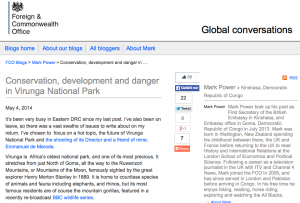We are very please that the UK Foreign Office (Mark Power) clearly positioned with the Virunga Alliance in a blog post “Conservation, development and danger in Virunga National Park” on 4MAY2014:
“The Park deserves our support not just to preserve its rare gorillas but also to promote the prosperity of those who live and work on its borders.”
Conservation, development and danger in Virunga National Park
May 4, 2014
It’s been very busy in Eastern DRC since my last post. I’ve also been on leave, so there was a vast swathe of issues to write about on my return. I’ve chosen to focus on a hot topic, the future of Virunga National Park and the shooting of its Director and a friend of mine, Emmanuel de Merode.
Virunga is Africa’s oldest national park, and one of its most precious. It stretches from just North of Goma, all the way to the Ruwenzori Mountains, or Mountains of the Moon, famously sighted by the great explorer Henry Morton Stanley in 1889. It is home to countless species of animals and fauna including elephants, and rhinos, but its most famous residents are of course the mountain gorillas, featured in a recently re-broadcast BBC wildlife series.
Emmanuel is mercifully on the mend and recuperating with his family – you can read his statement here. Meanwhile he and the rest of the Virunga team would like us to concentrate on the issues facing the Park. Virunga is threatened by environmental degradation security challenges as a result of weak governance in this part of Eastern DRC. For many years the Park has struggled to contain deforestation by local communities burning trees to create charcoal which is the main source of energy for the nearly 1 million inhabitants of Goma. Now it faces the challenge of oil exploration and a British oil company SOCO has been granted a concession by the Congolese Government within the Park. I often get asked about the UK’s position on the exploration – so this is an opportunity to be clear, the UK opposes oil exploration in the Park, which is a world heritage site. Our statement on the issue, first issued in September 2012 is worth repeating here as I often get asked our position:
‘The UK opposes oil exploration within Virunga National Park, a World Heritage sight listed by UNESCO as being “in danger”. We have informed SOCO and urge the Government of DR Congo to fully respect the international conventions to which is it is a signatory.
We remain committed to supporting UK companies in DRC and throughout the world. Foreign investment in sectors such as hydrocarbons and the extractive industries can play a vital role in boosting the development of DRC, lifting people out of poverty. Such investment needs to be done responsibly and sustainably, in compliance with local law and confirming to international standards.’
In collaboration with the Park, a documentary team has made a film about Virunga which premiered to much acclaim at the Tribeca film festival – you can watch the trailer and check out the details at virungamovie.com. I haven’t had a chance to see it yet, ironically it hasn’t been screened in DRC, but do catch it if you get the chance.
The main issue for me, since I first met Emmanuel and learned about the achievements of him and the fantastically energetic Virunga team is that their optimistic vision for the Park, which encompasses economic development, security and conservation in a troubled and very poor area is probably the most promising project in Eastern DRC. This vision recognises that conservation can’t ignore the legitimate need for those living within and around the Park’s borders to benefit from prosperity and development. A couple of months ago I visited a hydro electric power plant being constructed by the Park in Rutshuru with the support of the Howard G. Buffett foundation. When completed, this impressive project will provide 13 Megawatts of electricity to the surrounding area. This is more power than is currently available in North Kivu, and will be the first major electrification project for rural areas in the province. Outside of Goma and a couple of other towns there is virtually no electricity grid at all. The idea is for the water coming from the park to generate electricity to support the creation of sustainable businesses around the Park, meaning the population will no longer have to resort to destroying its habitat in order to make a living. It’s an impressive and ambitious project, but in my view, only this kind of economic development will ensure that this part of Congo is able to escape repeated cycles of conflict and reap the benefits of its abundant natural resources. Emmanuel’s leadership and his team’s hard work is essential to achieving this vision. That is why it isn’t just Emmanuel’s family and friends who are celebrating his survival. The population of North Kivu province and all of us working here to improve the prospects of this area can all be thankful his assailants were unsuccessful in killing him. The Park deserves our support not just to preserve its rare gorillas and but also to promote the prosperity of those who live and work on its borders.
You can find out more about the Virunga national Park, and the Virunga Alliance, the campaign to protect it at this website.
Mark Power

